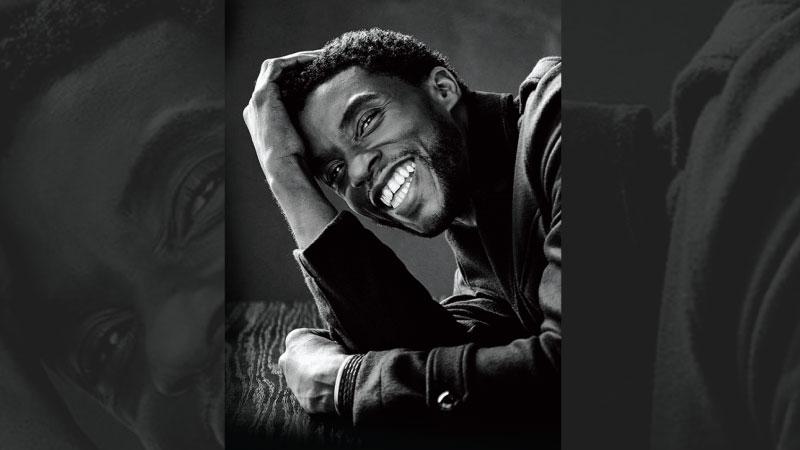
Chadwick Boseman received his big breakthrough with Brian Helgeland’s 42 (2013), where he played Jackie Robinson, the first-ever African-American Major League Baseball professional
The 43-year-old American actor Chadwick Boseman died on August 30. Best known for his role as King T’Challa/Black Panther in the Marvel Cinematic Universe (MCU), Boseman played a string of African-American icons during his career, including singer James Brown, civil rights activist Thurgood Marshall and Major League Baseball star Jackie Robinson. In a statement released by his family it was revealed that the actor had been fighting colon cancer for the last four years — he received a stage three diagnosis in 2016 and since then, the cancer had progressed to stage four. During this period, Boseman shot several films including Black Panther,Da 5 Bloods, and Ma Rainey’s Black Bottom - which will now be the actor’s final release.
Born and raised in the traditional manufacturing centre of Anderson, South Carolina, Boseman was first moved to consider a career in acting after staging a high school play about a basketball teammate who was shot to death. The son of a textile worker and a nurse, he went on to attend Howard University to study film direction. Throughout the 2000s, he appeared in various American TV shows, mostly in cameos (a particularly memorable one being his role as a street magician in a 2011 episode of Castle), before he received his big breakthrough with Brian Helgeland’s 42 (2013), where he played Jackie Robinson, the first-ever African-American Major League Baseball professional.
A much-adored figure in Hollywood, Boseman was an antidote to the popular perception of actors being largely apolitical and commerce-driven (indeed, his last-ever tweet was a picture with vice-presidential candidate Kamala Harris, urging people to vote). It wasn’t just the roles he picked — Boseman was also refreshingly honest during interviews and spoke candidly about making his way in an industry that remains largely white-dominated. For example, he fought with Marvel executives to portray King T’Challa with a Xhosa accent (as opposed to a European one). Boseman’s reasoning was that a Wakandan king’s accent or indeed, education, should have no European influences, since this was the most developed country in the world. As he told the LA Times in 2016.
“For me, Wakanda has never been conquered. So, I wanted to make sure that he didn’t speak like ... well, at one time they were thinking he’d have a European accent or an American accent. I said that would not be fine because if we did that, that would be saying that they had been colonised.”
Despite Marvel’s initial fears that the accent would prove to be too much for a ‘global’ audience, Boseman was vindicated when Black Panther (directed by Ryan Coogler) became the then-highest grossing Marvel movie of all time in 2018. Coogler and Boseman proved that one could achieve commercial success without compromising on one’s artistic or political beliefs. And yes, Boseman was quite aware of the biggest bloc of criticism Black Panther faced — namely, that in its framing of Eric Killmonger (Michael B Jordan) as a villain, the film was advocating against armed struggle and for a kind of centrist status quo (represented by King T’Challa/the monarchy). The actor, however, saw it differently: he declared unambiguously that he saw T’Challa as “the enemy, in a way, the enemy I have always known, born in privilege, in power, born with a vibranium spoon”. He explained that he saw neither character as an unambiguous villain, and that Killmonger deserved to be acknowledged as an icon of liberation.
“I don’t know if we as African-Americans would accept T’Challa as our hero if he didn’t go through Killmonger,” he said, in a public conversation with writer Ta-Nehisi Coates and BlackPanther colleague Lupita Nyong’O. “Because Killmonger has been through our struggle, and T’Challa hasn’t.
It is possible, of course, to grieve adequately by oneself. But in an ideal world, grief is a communal journey, a shared experience. There are days when you’re falling apart and there are days when you’re trying to keep someone else together — it’s folly to think that the two are separate phenomena. Boseman’s passing feels like an illustration of this truth: the number of stories people (especially African-American people with parents old enough to remember not being able to vote) are sharing on social media is overwhelming, to be honest. Stories about their children holding an ‘Avengers funeral’ for Boseman, stories about their aged parents crying while watching Black Panther on the large screen (“I never thought they’d put us onscreen like that”).
During his death scene in Da 5 Bloods (which will only become more poignant now that we know he was fighting cancer while shooting this), Boseman’s character Norm Holloway consoles his friend (who has just accidentally shot him), repeating their shared motto: “Blood don’t die, we multiply”. It’s more than just a life-affirming line. It’s an ideology, a reminder of standing up for something larger than yourself. It’s the kind of thing Boseman lived by — rest in
power, king.

